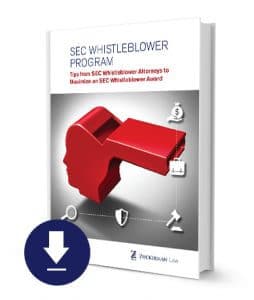Awards Paid from a Deferred Prosecution Agreement or Non-Prosecution Agreement
In September 2020, the SEC revised its whistleblower rules to add a new paragraph (3) to existing Rule 21F-4(d) to provide that the term “administrative action” includes a deferred prosecution agreement (“DPA”) or a non-prosecution agreement (“NPA”) entered into by DOJ as well as a settlement agreement entered into by the SEC outside of the context of a judicial or administrative proceeding to address violations of the securities laws; and further that any money required to be paid in such actions will be deemed a “monetary sanction” within the meaning of Rule 21F-4(e).
This proposed addition to Rule 21F-4 sought to make awards available to meritorious whistleblowers in cases where these alternative vehicles are used to address violations of law. Its premise was the same as that underlying current Rule 21F-4(d)(1) — that Congress did not intend for meritorious whistleblowers to be denied awards simply because of the procedural vehicle that the SEC (or another governmental entity) has selected to resolve an enforcement matter.
Rationale for Deeming Payments made under DPAs and NPAs as “Monetary Sanctions”
The September 2020 SEC release adopting amendments to the rules governing the SEC Whistleblower Program explains the rationale for deeming payments made under DPAs and NPAs as “monetary sanctions” on which an award can be based:
First, we have decided not to extend the rule to DPAs and NPAs entered into by state attorneys general in criminal cases. Second, we have added the modifier “similar” in paragraph (d)(3)(ii), which describes the Commission settlement agreements to which the rule will apply, in order to clarify the features of these agreements that merit treating them as administrative actions that impose monetary sanctions. Third, we have decided to apply the rule to any DPA, NPA, or Commission settlement agreement that would otherwise fall within the terms of the rule (provided that the agreement was entered into after July 21, 2010, which is the date after which the Dodd-Frank Wall Street Reform and Consumer Protection Act took effect).25
. . . Several circumstances inform our decision to treat DPAs and NPAs entered into by DOJ as forms of “administrative action” for purposes of Section 21F.27First, DOJ itself recognizes the importance of DPAs and NPAs in the hierarchy of tools that are available for addressing criminal misconduct on the part of companies, their officers, and their employees.28 DOJ has explained that DPAs and NPAs provide a “middle ground” for resolution of a criminal matter in circumstances where a declination is determined to be inappropriate, but a conviction of a company may have significant collateral consequences for innocent third parties.29Second, DPAs and NPAs entered into by DOJ ordinarily impose significant continuing obligations and conditions on subject companies, coupled with clear and substantial consequences for default–including the continuation or initiation of criminal prosecution.30 Thus, on its face, the terms of a DPA or an NPA reflect a substantive resolution of a criminal matter by DOJ–in other words, an action–and not simply the closing of the investigation.
For similar reasons, it is reasonable to view payments made under DOJ DPAs and NPAs as “monetary sanctions” on which a whistleblower award can be based. Section 21F(a)(4) defines “monetary sanctions,” in relevant part, as “monies, including penalties, disgorgement, and interest, ordered to be paid… as a result of such action or any settlement of such action.”31 The payments required under a DPA or an NPA with DOJ are enforceable as a result of the company’s admissions of facts and liability, which would support the government’s criminal charges, coupled with the company’s agreement to toll applicable statutes of limitations in the event DOJ determines (in its sole discretion) that prosecution is warranted because the company has breached the agreement. Given these provisions, the practical effect of a DPA or an NPA is to compel the subject company to make the monetary payments to which it has agreed or face the possibility of criminal prosecution on the basis of its previous admissions. Under these circumstances, payments made under a DPA or an NPA with DOJ are reasonably viewed as “ordered” within the meaning of Section 21F.32
In the implementation of our whistleblower program to date we have not had occasion to consider a DPA or an NPA entered into by a state attorney general in a criminal case. We proposed to include such agreements in Rule 21F-4(d)(3)(i) in the expectation that they should generally be similar in nature to DPAs and NPAs entered into by DOJ. However, we are persuaded by the concern expressed by one commenter that including state DPAs and NPAs in the rule risks introducing inconsistency in the eligibility standards for related action awards as a result of the application of varying culpability and other standards under state law.33 DPAs and NPAs are long-established in DOJ practice, and their terms, conditions, and use have been subject to a great deal of transparency.34 But the Commission has limited insight into the practices of 50 state attorneys general (plus the District of Columbia’s) in entering into DPAs and NPAs, and we believe it would be administratively infeasible to establish consistent award standards if required, on a case-by-case basis, to determine whether any particular state DPA or NPA includes terms sufficiently similar to those that typify DOJ DPAs and NPAs such that the state instrument should also be deemed an “administrative action” that imposes ““monetary sanctions.” For this reason, new Rule 21F-4(d)(3) does not extend to DPAs or NPAs entered into by state attorneys general in criminal cases.
The rule we are adopting today includes settlement agreements similar to DOJ DPAs and NPAs entered into by the Commission outside of the context of a judicial or administrative proceeding. In our practice, these agreements have included key provisions typically analogous to those found in DOJ DPAs and NPAs that warrant also treating them as “administrative actions,” with the payments required under these agreements constituting “monetary sanctions.” Among the provisions that we deem important to our analysis are: (1) substantial continuing obligations on the part of the respondent (e.g., detailed and specific cooperation requirements and a requirement that any successors to the respondent be bound by the agreement); (2) specificity as to conduct that constitutes a violation of the agreement (e.g., further violations of the federal securities laws, provision of false information, and failure to make payments on the schedule and in the amounts due); (3) tolling of applicable statutes of limitations; and (4) clear and substantial consequences for default, including the respondent’s agreement not to contest or challenge the admissibility in a future enforcement action of factual statements supporting the Commission’s case that are recited as part of the agreement, as well as the respondent’s consent to the use of any documents, testimony, or other evidence previously provided by it in a future enforcement action resulting from its violations.
How to Successfully Navigate the Process to Seek an SEC Whistleblower Award?
SEC Whistleblower Lawyers
If you are aware of securities fraud and need immediate representation, contact the SEC whistleblower lawyers at Zuckerman Law at 202-262-8959.
Click below to hear SEC whistleblower lawyer Matt Stock’s tips for SEC whistleblowers:
Recently the Association of Certified Fraud Examiners published a profile of SEC whistleblower lawyer Matt Stock’s success working with whistleblowers to fight fraud:
To learn more about the SEC Whistleblower Program, download Zuckerman Law’s eBook: SEC Whistleblower Program: Tips from SEC Whistleblower Attorneys to Maximize an SEC Whistleblower Award:











